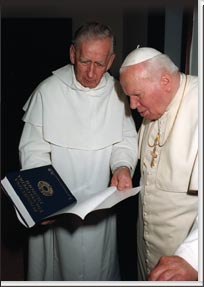|
|
|
|
|
|
|
|
|
|
|
 |

Philosophy of politics and culture According to Krąpiec, man as the sovereign being and the author of culture is at the very center of the whole conception of society and culture. The sovereignty vested in human person as able to make conscious and free decisions is of crucial importance when considering the primary position of the human person in his relation to any collectivity, whether society in general or the state. Society is "a complex of organized mutual relations between people", designed by nature to aid the comprehensive development of man as a person, which is called the common good. All the other goods of society are subordinated to this chief purpose. The common good is also a criterion of estimating the value of any given social and political order or system. According to Krąpiec's approach, the basis for the existence of society is the set of real relations of each person to the common good as a realization of his personal potentiality. Society as a being that is "necessary by nature" is linked to the principles of natural law. The realization of the common good depends on regulation of how the community functions according to the principles that are to be read out from the nature of man. There are many social structures that are in conformity with the natural superior goal, yet those of the most importance and durability are following natural social structures: the family, the nation, and the state. As such these structures are closest to the realization of the common good of any given person. All actions and their results, social life and the expression of social life, result in what is called culture. The creator of culture is man, who realizes the common good and is oriented toward truth, good, beauty and sanctity. The warranty of the culture under the aspect of its authentically humanistic tenor is its subject: a man guided by the truth and the good in his acting and doing. The life of the individual within society is determined on the basis of natural law, which in turn is expressed in the field of human rights. Rights are natural entitlements of either human person. These entitlements (ius, iura), such as right to live, the right to truth, freedom of conscience, have their justification in man's rational nature, especially as far as the reference of human being to the common good is concerned, and this is what makes them quite different from positive laws (lex, leges), which are in force cause of will of a lawmaker. Human rights in sense of ius are to be the reason for established law that in turn should have the criterion of its legality in conformity to the principle of common good (Krąpiec emphasized that the Universal Declaration of Human Rights proclaimed by the United Nations is a document that ultimately refers to man's rational nature). In the field of philosophy of politics, Krąpiec stresses the primacy of the common good and of morality, and in so doing he resists modern tendencies that have shifted politics (since Machiavelli) from the realm of morality to the realm of art, where the contract and the effectiveness count most of all. According to Krąpiec, politics is the well-advised realization of the common good. As subordinated to certain goal, which is a personal good of man, politics is the realm of "morality of human social acting and doing". Krąpiec called the state a "natural and necessary organization of families and communities well-conducted in order to realize human good", and as such it is a being called up into existence for the sake of the good of sovereign individuals. Essential to the structure of the state are the following elements: a system of law, and the role of state authorities (and the ways of its administration). The value of a state is determined by the degree to which it actually realizes the common good within its social and economic institutions within a particular legal system. |